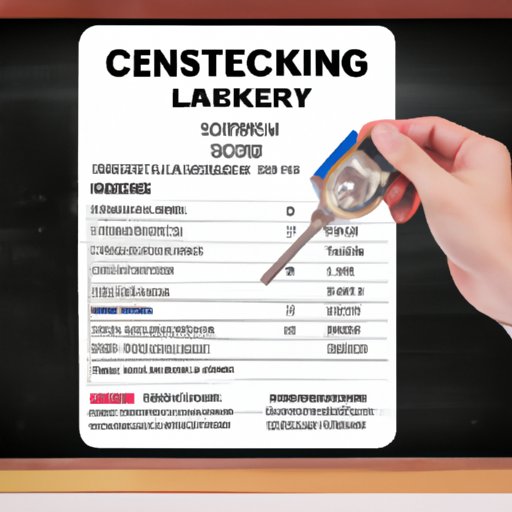
How to Get a Bartending License: A Step-by-Step Guide
If you’re interested in working in the hospitality industry, becoming a certified bartender is a great way to start. Not only will you have the skills and knowledge necessary to make a variety of delicious cocktails, but you’ll also open up many job opportunities, including bartending gigs at restaurants, hotels, and bars. In this article, we’ll go over everything you need to know to get your bartending license, including the necessary steps to take and helpful tips for success.
Step-by-Step Guide
The process of obtaining a bartending license can vary depending on your state and local regulations, so it’s important to research the requirements in your area. However, these are the basic steps you’ll need to follow:
Research the necessary requirements to practice bartending in the state you are in.
Most states require bartenders to be at least 21 years old and have a valid ID. Additionally, you may need to complete an accredited training program or certification course and pass an exam. Some states also have restrictions on the type of alcohol you can serve or the hours you can work. You can find this information on your state’s website or by contacting your local alcohol beverage control board.
Find accredited courses or online certifications to take.
Many colleges, trade schools, and private organizations offer bartending courses. Look for a program that is accredited by your state and recognized by the industry. Online certifications are convenient and flexible, but make sure they are legitimate before enrolling. Research the course thoroughly, read reviews, and verify its standing with your state’s licensing board.
Attend classes and complete the examination process.
During your certification course, you will learn the basics of bartending, such as mixing techniques, liquor types, and beverage service. You will also take a written and practical exam to demonstrate your proficiency. Some courses offer both in-person and online learning options, while others require participation in physical classes. Be sure to choose a course that meets your schedule and learning preferences.
Apply for the license and pay the fees.
After completing your certification course and passing the exam, you can apply for your bartending license. You will need to submit an application and any required documentation, such as proof of age, completion of the certification course, and a background check. Fees for the license and renewal will vary by state and may be subject to change. Once you’ve submitted your application and paid the fees, you’ll need to await approval, which can take a few weeks to a few months.
Tips and Tricks
Here are some additional tips to help make the process of obtaining a bartending license easier:
Take an online bartending certification course for added flexibility and convenience.
Many online courses offer the same curriculum as in-person classes, but they are often self-paced and can be completed on your own schedule. This is ideal for those who work full-time or have other commitments.
Research different providers and read reviews before selecting a course.
Don’t just enroll in the first program you find online. Research different providers, read reviews from past students, and compare course content, tuition, and certification options before making a decision.
Practice mixing drinks at home to improve your techniques.
The more you practice, the more confident you’ll feel behind the bar. Invite friends over and experiment with different recipes until you master the basic and advanced techniques. Make sure to use responsible drinking habits when practicing.
Network with other bartenders or industry professionals to get insider tips and tricks.
Join a bartending group or community, attend events, or connect with other professionals in the industry to learn from experienced individuals. Ask for feedback, advice, and recommendations to help you improve your skills.
Personal Experience
As a licensed bartender myself, I can attest that the process of obtaining a certification is straightforward but requires patience and dedication. It’s not just about learning how to mix drinks, but also following safety regulations, providing excellent customer service, and adhering to industry standards. I found an online certification course in my state and was able to complete it within a few weeks. Although I faced some initial challenges such as finding the right course provider and practicing the practical exam, I was able to overcome them with hard work and determination. My suggestion to readers is to stay motivated and remember the ultimate goal of becoming a successful bartender.
Industry Advice
To get some expert insights, I interviewed a local bartender with over 10 years of experience. According to him, the most important qualities for a bartender are being patient, attentive to customers, and knowledgeable about different beverages. He recommends that aspiring bartenders start by practicing their mixology skills and working on their customer service skills. He also emphasized the importance of networking and building relationships within the industry, as it can lead to more job opportunities and professional growth.
Pros and Cons
Before deciding to pursue a bartending license, it’s essential to weigh the pros and cons:
Pros
- Increased job opportunities.
- Higher pay rates.
- Opportunity to meet new people.
- Develop new skills and knowledge.
- Flexibility in work schedules.
Cons
- Cost of certification program and licensing fees.
- High competition in some markets.
- Physically demanding job.
- Late night and weekend work can interfere with social life.
- Can be a high-stress work environment.
Conclusion
Obtaining your bartending license is a crucial step towards starting a successful career in the hospitality industry. With the right attitude, determination, and knowledge, anyone can achieve this goal. Remember to research your state’s requirements, select an accredited course provider, practice and refine your skills, and network with other professionals in the industry. If you’re passionate about mixing drinks and providing excellent customer service, the benefits of becoming a certified bartender are numerous.




